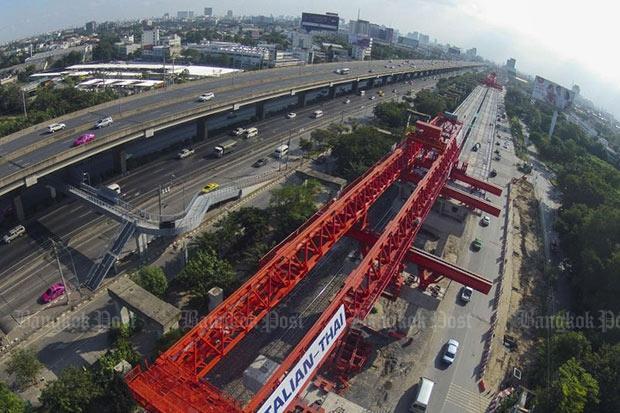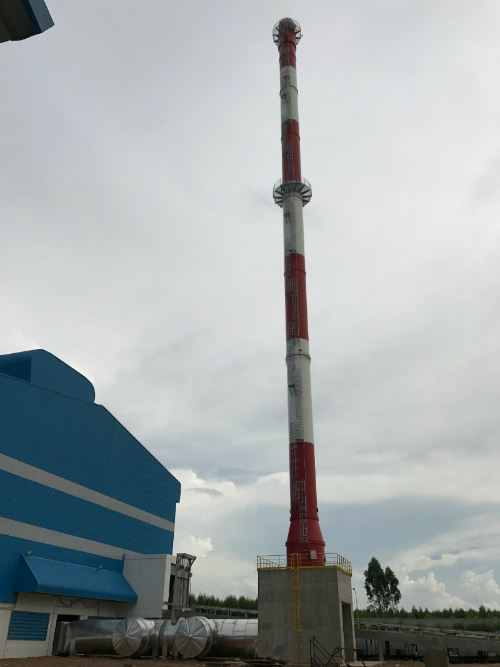The image shows the construction site of the Red Line mass transit route in Bangkok. (Bangkok Post file photo)
TOKYO: Transport Minister Arkhom Termpittayapaisith has confirmed a number of big-ticket infrastructure projects including five mass-transit routes in Bangkok and three planned motorways will start construction by mid-2016.
The mass-transit routes comprise the 34.5-kilometre Pink Line (Khae Rai-Min Buri) worth 56.8 billion baht, the 30.4-km Yellow Line (Lat Phrao-Samrong) worth 54.8 billion, the 21.2-km Orange Line (Thailand Cultural Centre-Min Buri section) worth 110 billion, the 19.8-km Purple Line (Tao Pun-Rat Burana) worth 91.7 billion and the 27-km Blue Line extension (Hua Lamphong-Bang Khae and Bang Sue-Tha Phra sections) worth 82.5 billion.
Mr Arkhom said his ministry had already submitted the Pink and Yellow Line projects for vetting by the Public-Private Partnership (PPP) Committee.
Details of the development projects will be submitted to the State Enterprises Policy Committee and PPP committee next February, followed by the cabinet in March in order to call bids in May. Construction should start in mid-2016.
The Orange and Purple lines will be submitted for cabinet consideration by mid-December, while the Transport Ministry must also approve details of the Blue Line extension this month, Mr Arkhom said.
He said his ministry had opened bids for the 32-km Pattaya-Map Ta Phut motorway worth 14 billion baht, with construction expected to kick off next year.
However, he said environmental impact assessments are needed for the 196-km Bang Pa-in-Saraburi-Nakhon Ratchasima motorway, costing 84.6 billion baht, and the 98-km Bang Yai-Kanchanaburi motorway costing 55.6 billion. The PPP committee wants the Transport Ministry to approve the two projects this month as part of the government’s PPP fast-track scheme so they can be implemented by mid-2016.
In a related development, Mr Arkhom said his ministry would propose to the cabinet today approval of action plans for 20 infrastructure projects worth a combined 1.79 trillion baht. Those projects would commence investment from 2016-22 as part of an eight-year infrastructure development plan.
He said Thailand and Japan agreed to establish a special vehicle company (SPV) through a Japanese private company and the State Railway of Thailand to develop a 547-kilometre rail route from Ban Phu Nam Ron on the Kanchanaburi border to Sa Kaeo’s Aranyaprathet border with Cambodia. A new one-metre gauge railway will be built linking Kanchanaburi and the planned deep-sea port in Dawei, Myanmar.
Mr Arkhom and Japan’s Land, Infrastructure, Transport and Tourism Ministry signed a cooperation memo in Tokyo last week on the route development. Each parties’ stake in the SPV and the scale of investment will be discussed later.
The Japanese government, through the East Japan Railway Co, is expected to finish a feasibility study on possible joint investment in a 715-km Bangkok-Chiang Mai high-speed train by next June, he said.
Thailand and China will meet on Thursday to follow up on construction plans for delayed rail investment between the two countries. The Chinese still need to submit their version of the construction costs to the joint committee before the project can be finalised, Mr Arkhom said.
“Thailand reserves its right to inspect the costs before the project starts,” he said.
“The Chinese are mulling the details more than with any of its other co-development projects with other countries.”
China proposed rail transport cost of 2.80 baht a tonne, but Thailand said truck transport was only two baht a tonne and rail transport should be cheaper.
Source: http://www.bangkokpost.com/business/news/781093/2016-will-see-flood-of-projects


